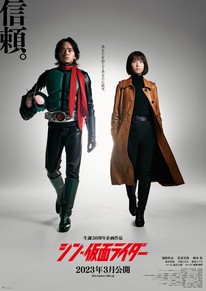Review
by Richard Eisenbeis,Shin Kamen Rider
| Synopsis: |  |
||
Takeshi Hongo has been kidnapped by the secret evil organization SHOCKER and transformed into a grasshopper mutant cyborg. However, with help from Ruriko, the daughter of his mentor and a traitor to the organization, he is able to escape. Now, it is up to the pair to fight back against SHOCKER and stop their plans to dominate mankind. |
|||
| Review: | |||
Shin Kamen Rider is both a retelling of and an homage to the original 1971 Kamen Rider TV series. There are many recognizable characters and numerous shot-for-shot recreations in the film. That said, it's not afraid to change the story of the original—dramatically in some cases. Moreover, despite its loving connection to the original, you don't need to know anything about the 50-year-running franchise to enjoy and understand this film. However, its reverence for the TV show is also the source of the film's main problem. Like with Shin Ultraman—the last tokusatsu re-imaging penned by Evangelion creator Hideaki Anno—Shin Kamen Rider feels like it should have been a mini-series rather than a movie. The film is split into five distinct acts, each with its own largely self-contained plot and a mutant cyborg to be defeated. Unfortunately, the 120-minute nature of the film means that not all of them get the time they need. This is most apparent at the start of the film, where the origin of Kamen Rider, the backstory exposition dump, and the first big battle are all crammed into the first 15 minutes. All that said, the problems stemming from the film's episodic nature are largely offset by the lead pair and how they change and grow over their adventures together. Takeshi is a kind-hearted man who suddenly finds himself going berserk and exploding people's heads with his super-strength. The son of a police officer, he finds his actions unforgivable. The blood on his hands plagues him throughout the film—even as he resolves to fight SHOCKER. But what really keeps him moving forward is his relationship with Ruriko. Granting his mentor's dying wish to protect her saves him early on, but what they build together allows him to fight on until the end of the film. Ruriko, on the other hand, appears cold and logical—focused solely on taking down SHOCKER. But below the surface, she faces as much inner turmoil as Takeshi. While they may be evil, each mutant they face is someone she knows—some of them are even people she sees as friends. It may be for the greater good, but that doesn't mean she isn't betraying and killing the people she grew up around. Luckily, Takeshi can see and understand both sides of her. His kindness and understanding allow her to face what she is feeling rather than self-destructively bury it deep down. We get a true partnership from the pair—the two of them against the world. SHOCKER wants them dead. The police view them as untrustworthy allies. Yet, they are the world's only hope. They're easy to root for, and all the emotional beats surrounding them hit well. Despite the action and world-saving stakes, the film still feels like a personal story about them. On the visual side of things, this very much feels like an Anno film. It's full of weird camera angles and quick cuts, keeping things visually interesting even during the most boring expository dialogue. The camera work can be distracting in some fight scenes, making it hard to follow the action. On the other hand, the film has some amazing static shots—from beautifully composited landscapes to close-ups of our heroes in their most emotional moments. Shin Kamen Rider uses an amalgamation of 1970s-style tokusatsu costumes and modern ones. For the most part, this works well. The Rider outfits are strikingly similar to their 70s versions—only with a few more details added or color changes. And it's surprising that even something as simple as adding a trench coat to our hero makes the classic design feel modern. However, there is still a bit of a disconnect between the classic designs and the film's original ones—especially when it comes to the villains with their LED glowing, high-tech-looking masks. As for the music, it is filled with re-imaginings of classic themes and musical cues. However, none of them feel out of place in the film. Like the rest of the presentation, it almost perfectly threads the needle between retro and modern. Overall, Shin Kamen Rider is a solid film and a love letter to one of the grandfathers of tokusatsu TV shows. Clearly, everyone involved with this film had a real passion for their work and what came before. While it has problems in pacing due to its insistence on following an episodic format, it also has the best character work and emotional moments seen in any of the three “Shin” tokusatsu films. Whether you're a Kamen Rider fan or not, if you've enjoyed Evangelion, Shin Godzilla, or Shin Ultraman, this film is worth watching. |
| Grade: | |||
|
Overall : B+
Story : B
Art : A
Music : B
+ A great heroic pair that form the emotional core of the film. A loving homage to a classic that isn't afraid to do its own thing. |
|||
| discuss this in the forum (17 posts) | | |||
| Production Info: | ||
|
Full encyclopedia details about |
||